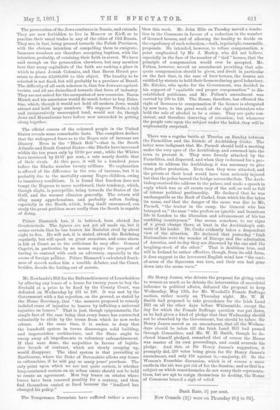blow this week. Mr. John Ellis on Tuesday moved a
resolu- tion in the Commons in favour of a reduction in the number of licensed houses, and of allowing the locality to decide on the expediency of such reduction,—both, inprinciple, reasonable proposals. He intended, however, to refuse compensation, a point emphasised by Mr. J. Morley, who did not believe, especially in the face of the number of " tied " houses, that the principle of compensation would ever be accepted. Mr. Fulton, however, moved an amendment providing that ade- quate compensation should be given, and dwelt in particular on the fact that, in the case of beer-houses, the lessees are entitled by statute to hold their licences during good behaviour. Mr. Ritchie, who spoke for the Government, was decided in his support of "equitable and proper compensation" to dis- established publicans, and Mr. Fulton's amendment was carried by 190 to 129. The House, therefore, has affirmed the right of licensees to compensation if the licence is abrogated by new laws, to the great wrath of the rigid teetotalers who hold the sale of alcohol to be a crime. They are quite con- sistent, and therefore deserving of attention ; but whenever the people vote upon the subject under the ballot, they will be unpleasantly surprised.






































 Previous page
Previous page